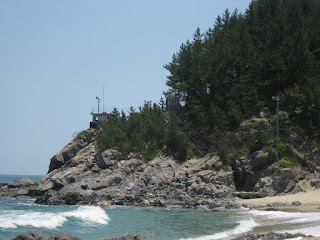(Natalia, Mariko, and I left our mark on Korea...)
I am just wrapping up my last weekend in South Korea. Lots of friends, lots of food, and lots of fun. I am sitting in an almost empty, and very clean, apartment, looking at my plants that have been my companions over the last year. A year! Amazing. Truly a sign of age - time flies by faster and faster. My year here has been fantastic, and I am happy for the people I have me, the places I have been, and the lessons I have learned. My path in life has definitely been different than I ever thought it would be, but I am so glad that it has been. Even though this experience is almost over, I really feel that in a very tangible way it will continue. I have made friends here that really made my time in Korea great, and with the ease of communication today, even though I will be half the world away, it won't really feel that way. Korea will always hold a special place in my heart. There are so many place I want to see in the world, that I don't know if I will ever make it back here, but I will miss many things here from the food, to the ease of life, to the beauty of the peninsula. Two more days...a mix of emotions.
(Christa, Jin, and I)
(Some of the girls...and T.J.)













